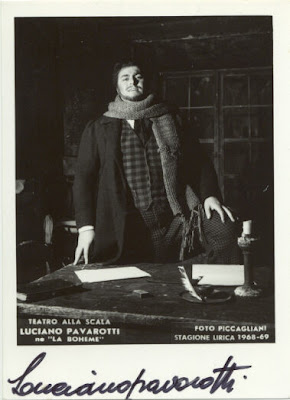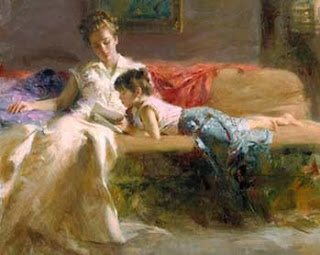
Culture means a lot of things to people. Most of those things we never think about, if we even notice them at all. Somebody described culture as a Society's personality. I think that's about right. And you can certainly tell a lot about a person from their personality.
Not everything, certainly, but you can get a heaping helping of who they are, inside, from the personality they display. The same goes, I think, for a Society, be it a Knitting Circle, Poker Club, Religion, or a Nation.
We have seen the effluvium of one culture washing ashore in our own Nation, weakening our resolve, threatening our very existence, damaging our spirit, and we as a Nation seem unable to recognize it for the poisonous Evil that it is. We refuse to unite as a Society to stem the tide of this poisonous culture as it washes ashore. We fear offending the adherents to this culture because they like to use our own culture as a weapon against us.
Some among us cannot even see that this culture is anything out of the ordinary, and attempt to sway us with the bizarre claims that if we simply step carefully it will not touch us, nor infect us. But it has. You probably recognize that poisonous culture as Islamism, Islamofascism, Wahabbism, or any of the various names it has garnered.

The culture of modern Islamism is a poison. You can detect the effects of that poison from the various nations which it controls and degrades. Just as you can see the family culture of those who are thieves, addicts, abusers, you can see the same in the acts of those people who live within and support Islamism. This culture feeds off the successes and achievements of those it infiltrates, subjects, and destroys. It creates nothing of its own save economic ruin, degradation of its women, violent attacks against those who resist, and the terror of its cowardly homicidal way of dealing with better, more successful, peaceful cultures. The people of the Islamist nations are illiterate, ignorant, poverty-stricken, disease-ridden serfs, subjugated to the poisonous Mullahs who attain power through intimidation and slaughter.
And still, knowing the facts, our own people seem reluctant to point to the disease, and say, "Unclean!" Our own people have been subjected to the slow erosion of common sense by agents of yet another poisonous culture: Socialism/Communism. Through the control of the education system, the media, and the governmental agencies that have the power to destroy us, the Left has poisoned our people, and continue to do so. They use the weapons of the Big Lie, the massive media-supported personal attacks, and attempt to silence those who would warn us of the disease.
After nearly a century of Leftist-guided education, our people find themselves nearly weaponless, unable to defend ourselves. Our children are taught in the government schools that right and wrong are simply words, which can mean almost anything. They are taught that every culture is equal, but that their own is Evil. They are subjected to political indoctrination which tries to "dumb them down" and make them passive sponges who will absorb and squeeze out any mindless drivel they wish to drum into their heads.

The Leftists have been so successful at this that the demise of the Communist Bloc barely slowed them or embarrassed them at all. They continue their drive to reduce Americans to powerless automatons, dependent on an all-powerful government, willing to cast aside what they know is fact for what the Leftists tell them is so. And they have reduced our offspring to rude, loud, spoiled nitwits who believe they can do whatever they wish, whenever they wish, and suffer no consequences for their actions.
Which brings me to the latest insanity of the diseased culture in America, Andrew Meyer, erstwhile victim of Police Brutality at the University of Florida. Meyer, displaying the arrogance of the spoiled, leftist-educated, loudmouth, decided to harangue Senator John Kerry at a speech at the University. His was not a rational, respectful question, but rambling, dis-jointed harangues that made little sense, and may have been intended to gain a laugh or two from his friends. Typical of the Leftist rules for public engagement, he was "just trying to ask a question". But that is not what these diseased individuals are doing. By asking ugly questions, hurling abuse, screaming at the top of their lungs, and appealing for help from the crowd, these individuals do their level best to provoke a response and embarrass those they are haranguing. They fight the police and complain that they were roughed up. They refuse to allow others to speak and complain that they are not being allowed to speak. (Leftists believe that freedom of speech is only for their use. A symptom of the diseased culture of Leftism.)
In the case of Meyer, he was near the back of a line of students who were going to ask Kerry questions. When the moderator announced that time was running short he bulled his way to the front (Rude, thoughtless actions are another symptom of this diseased Leftist culture) and "had his say". Here's what a witness had to say in an
email to Michelle Malkin:
Since Meyer and I were both in the back of each line, it did not seem likely that our questions would be answered.
However, while Senator Kerry was responding to a student’s question, all of a sudden Meyer rushed to the microphone with cops in pursuit. At that point no one knew what was going on. Could he have a gun, a bomb? Immediately, Meyer began yelling into the microphone that he had been waiting in line forever and that Senator Kerry should “spend time to answer everyone’s questions!” Senator Kerry tried to calm the student down by telling him that he would “stay here as long as it takes to get the questions answered.” The police approached Meyer who began taunting them by saying “what! are you going to taser me? are you going to arrest me?!” The police grabbed Meyer, but Senator Kerry asked the police to let him go and that he would answer his question. Senator Kerry finished answering the other student’s question and then proceeded with Meyer. (*This entire scene is not in any video I can find so far. This is why 2 cops are seen right behind Meyer at the start of some videos*).
Meyer approached the microphone and began to talk about a book he had which stated that Kerry won the 2004 election because of disenfranchisement of black voters and faulty voter machines that produced “Bush” as the winner. He then posed another question about why President Bush had not been impeached. “President Clinton was impeached because of a blowjob, why not Bush?”. The third and strangest question he posed to Senator Kerry was asking him if he was part of the skull and bones society with Bush at Yale. Meyer’s mic cut off after that, probably because he had mentioned the word “blowjob”. The cops grabbed him, but Meyer was able to get away several times. Eventually more cops were brought in to help subdue Meyer. Meyer continued to resist arrest, scream, curse; however he was eventually subdued by about six cops up around the entrance. As he is on the ground, he is told several times to put his hands around his back. He is also warned that he will be tasered if he does not comply. Eventually he is tasered twice. The video does not show whether he complied or not.
Senator Kerry was trying to answer his question to the audience, mostly the one about faulty voter machines. I am a die hard conservative Republican but I do respect Senator Kerry for trying to soothe the situation as best he could and trying not to escalate the situation. He DID intervene by letting the student at least present his question. I never received an opportunity to ask my question, but when Senator Kerry ended the show after the Meyer incident, he did come off stage to shake hands and give autographs. At that point, I was able to ask him my question, shake his hand, and get a autograph at the same time. Now why couldn’t Andrew Meyer do that?
The witness has been inoculated by his parents against the culture of the Left. Meyer hasn't been - his parents are probably fully infected. They will undoubtedly sue the University Police for brutality, despite the evidence that Meyer fought them. The Left already is raising Meyer to the status of a Martyr, and denouncing poor Senator Kerry for not denouncing the police actions fast enough. Because Meyer simply did what the Leftist-infected Democrat Party now considers legitimate political activity. Stalking opponents, or those not on the "in" is how the Left keeps the rest of us in line. It's part and parcel of the Leftist Culture. Why is this a problem?
To fight infection you need the will to defeat it, and the means to do so. The Left would leave us unarmed, and without the will to resist anything. By minimizing the danger to our nation and our culture from Islamism, the Left leaves us exposed to massive attacks and unable to respond. They would see us destroyed rather than to join in the fight against the disease. Why? Because the Left is a disease itself.
When the World Trade Center was destroyed, the Pentagon was almost destroyed, and a fourth attack was thwarted on 9/11/01, the healthy response of most Americans was, "Who did this? Where are they? What are we gonna do about it?" The Left remained quiet for a short time while pretending to support the American anger at the sneak attack on civilians and the innocent. But soon enough they began their mindless drumming of introspective drivel. They flooded the media with their idiotic statements and questions.

"What did
we do to deserve this?"
"Why do they hate us?"
"Why are we rushing to judgement on this?" (That, within days of the attacks, and continuing right up to the invasion of Afghanistan and then Iraq.)
"It was an isolated incident." (The favorite of the governmental types)
"Islam is a Religion of Peace." (This despite Islam's history of endless, bloody violence to spread their warped religious tenets to the world.)
"The attacks were by Israel." (Another typical symptom of the disease of Leftism and Islamism.)
"Our own government did it to get us into a war for oil." (Is there any medication that can cure this evident derangement?)
Two diseased Cultures are attacking the American body. One is the violent, primitive disease of Islamism. The other is the debunked, inhuman disease of Leftism. One attacks us primarily from without while infiltrating our borders and planning horrendous attacks on us from within. The other works primarily from within, debasing and degrading our political system, ruining our education system, destroying our culture, and thus our Society.
American Culture is unique, and rowdy, turbulent, loud, and boisterous. We are a people filled with a love of the individual, and a suspicion of the mob. We are at times a greedy people, while quick to give our money, belongings, time and effort to those in need. We are bull-headed at times, and thoughtful at others, leery of involving ourselves in the affairs of other nations, but quick to come to the aid of our International friends. We have created a government that is supposed to protect our rights, and allow our citizens the greatest possible freedom in our lives.
That is our Culture. The Cultures of the Islamists and the Leftists would willingly destroy that. We are healthy but exposed, and the diseases of Islamism and Leftism are attacking us ceaselessly. Will we win, or will the diseased cultures win?
Whose personality would you see triumphant?
 Please read "Americanism versus Anti-Americanism" at WILLisms.com
Please read "Americanism versus Anti-Americanism" at WILLisms.com



























